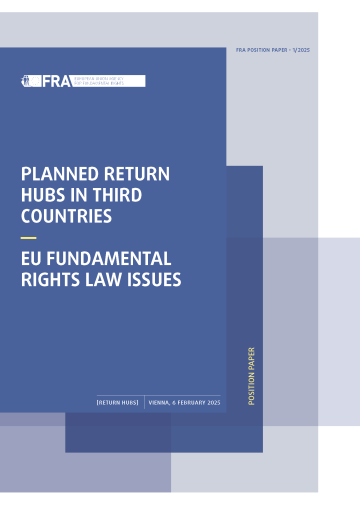Help us make the FRA website better for you!
Take part in a one-to-one session and help us improve the FRA website. It will take about 30 minutes of your time.
- This legal analysis sets out the European Union Agency for Fundamental Rights’ initial position on the planned creation of ‘return hubs’ in third countries as a measure to increase effective returns. Return hubs are understood as open or closed facilities physically located in third countries. Such facilities would temporarily host third-country nationals with an order to leave the territory of the EU or a refusal of entry issued by an EU Member State, until the Member States or the European Border and Coast Guard Agency (Frontex) organise their return home. No such return hubs have been established yet.
- The underlying idea of setting up a return hub in a third country is to have a location outside the EU where returnees can be accommodated until the Member States and/or Frontex implement their return to the country of origin. The hub itself may be directly managed by Member State authorities, by the third country hosting it or be administered jointly.
- Return hubs are not a rights-free zone. Member States and/or Frontex remain accountable for those rights violations in relation to their conduct after the returnees are transferred to the hub. This is different from the situation where Member States hand over a third-country national without the right to stay to the authorities of a (neighbouring) third country based on a readmission agreement and then stop any further involvement with the returnee.
- The planned creation of return hubs in third countries as a measure to increase effective returns is only compatible with EU law if accompanied by a clear and robust set of safeguards.
- The first pre-condition and the starting point for any return, regardless of the envisaged destination of the returnee, is the issuance of a valid and enforceable decision ordering the individual to leave the Member State or refusing entry. Such a decision must always be based on an individualised assessment. Article 47 of the Charter of Fundamental Rights of the European Union (the Charter) requires that the individuals concerned must have the right to an effective judicial remedy to challenge such a decision. The transfer to a return hub located in a third country must be expressly allowed under EU law. Articles 4 and 19 of the Charter prohibit any transfer if third-country nationals moved there would be exposed to serious harm, to inhuman or degrading treatment or to a flagrant breach of the right to liberty (arbitrary detention). Rules on pre-removal detention and the primacy of voluntary departure over forced removals further limit the categories of people who could be transferred to a return hub. Persons in a vulnerable situation require particular attention, which makes their lawful transfer to a return hub highly unlikely and difficult to implement. Children should be excluded from any transfers to return hubs.
- As a second pre-condition, a legally binding agreement with the third country hosting the hub must regulate at least core aspects relating to the implementation of a return hub scheme. The agreement must provide for a clear and adequate legal basis to enable the lawful transfer of third-country nationals to the hub. The agreement may be concluded by the EU or its Member States. Member States continue to act within the scope of EU law when they run a return hub in a third country and implement returns from there. The agreement must respect the rights and principles set out in the Charter. This also entails a duty to take preventive measures to mitigate the risk of rights violations while third-country nationals stay in the return hub. A fundamental rights impact assessment should analyse ex ante any risks and how to mitigate them.
- A third pre-condition flows from the fact that the Member States and/or the EU will be in charge of the returnees’ departure or removal from the hub to their country of origin or habitual residence. This creates a duty under international law and EU law to respect the prohibition of refoulement and collective expulsion, and to respect fundamental rights and dignity when Member States or Frontex implement removals from the hub. The agreement setting up the return hub must comply with EU fundamental rights law, prevent arbitrary detention and set minimum standards for the material conditions and treatment of third-country nationals accommodated in the hub. If, at least in part, Member States use EU funds to cover the costs of the return hub, the specific safeguards applicable to the relevant EU funding instrument also apply.
- Primary EU law does not ban the possibility for Frontex to implement removals from one third country to another. However, it exposes the agency to a constant risk of operating in violation of the principle of non-refoulement enshrined in Articles 18 and 19 of the Charter. To mitigate such risk, robust and clear fundamental rights safeguards must be in place, if this option is to be considered.
- Considering the serious fundamental rights risks connected with the running of return hubs, any agreement which may be concluded with third countries envisaging the establishment of return hubs should include provisions on effective and independent human rights monitoring mechanisms.
-
This legal analysis does not examine the extraterritorial processing of asylum applications. Third-country nationals who reach Member State territory either on their own or after being rescued at sea and seek asylum must be channelled into national asylum procedures respecting the safeguards of the EU asylum acquis and in full compliance with the European Convention on Human Rights and the 1951 Geneva Convention relating to the Status of Refugees. This legal analysis applies nevertheless to return procedures Member States may carry out from centres located in third countries, as may be the case for the Italian centres created in 2024 in Albania.
